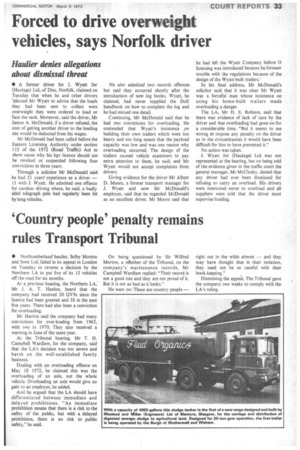Forced to drive overweight vehicles, says Norfolk driver
Page 35

If you've noticed an error in this article please click here to report it so we can fix it.
Haulier denies allegations about dismissal threat
• A former driver for J. Wyatt Jnr (Haulage) Ltd, of Diss, Norfolk, claimed on Tuesday that when he and other drivers 'phoned Mr Wyatt to advise that the loads they had been sent to collect were overweight they were ordered to load or face the sack. Moreover, said the driver, Mr James A. McDonald, if a driver refused, the cost of getting another driver to the loading site would be deducted from his wages.
Mr McDonald had been called before the Eastern Licensing Authority under section 115 of the 1972 (Road Traffic) Act to show cause why his hgv licence should not be revoked or suspended following four convictions in three years.
Through a solicitor Mr McDonald said he had 21 years' experience as a driver — 11 with J. Wyatt. He admitted one offence for careless driving where, he said, a badly sited telegraph pole had regularly been hit by long vehicles. He also admitted two records offences but said they occurred shortly after the introduction of new log books. Wyatt, he claimed, had never supplied the DoE handbook on how to complete the log and he had missed one detail.
Continuing, Mr McDonald said that he had two convictions for overloading. He contended that Wyatt's insistence on building their own trailers which were too heavy and too long meant that the payload capacity was low and was one reason why overloading occurred. The design of the trailers caused vehicle examiners to pay extra attention to them, he said, and Mr Wyatt would not accept complaints from drivers.
Giving evidence for the driver Mr Albert D. Moore, a former transport manager for J. Wyatt and now Mr McDonald's employer, said that he regarded McDonald as an excellent driver. Mr Moore said that he had left the Wyatt Company before 0 licensing was introduced because he foresaw trouble with the regulations because of the design of the Wyatt-built trailers.'
In his final address. Mr McDonald's solicitor said, that it was clear Mr Wyatt was a forceful man whose insistence on using his home-built trailers made overloading a danger.
The LA, Mr H. E. Robson, said that there was evidence of lack of care by the driver and that overloading had gone on for a considerable time. "But it seems to me wrong to impose any penalty on the driver as in the circumstances it would have been difficult for him to have prevented it."
No action was taken.
J. Wyatt Jnr (Haulage) Ltd was not represented at the hearing, but on being told of the evidence given in the traffic court the general manager, Mr McClusky, denied that any driver had ever been dismissed for refusing to carry an overload. His drivers were instructed never to overload and all suppliers were told that the driver must supervise loading.




















































































































































